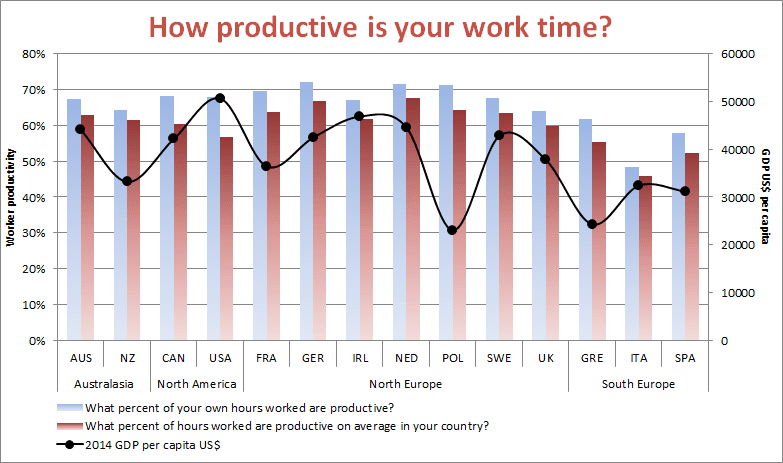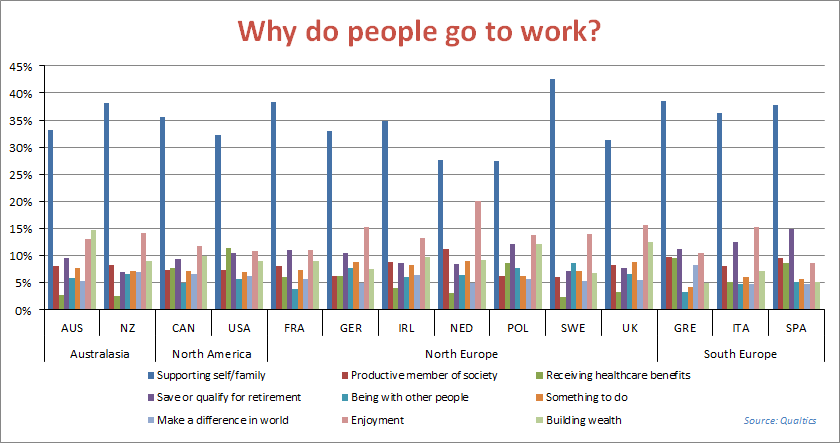Comparing workforces: Measuring employee productivity and motivation around the world
- 5 Min Read
Europe, North America and Australasia compared: What makes a good manager and why do your employees come to work?
- Author: Owain Thomas
- Date published: Mar 31, 2016
- Categories

Understanding why employees come to work and what motivates them to do a good job should be an important task for businesses looking to make the most of their people.
This can be even more so in the light of employees admitting that around one third of time spent in work is wasted on not doing work tasks.
In fact in Italy employees confessed that working was the minority of time spent in work, according to Qualtrics research.
The consultant surveyed 6,250 employees across 14 countries – seven from northern Europe, three from southern Europe, two from North America and two from Australasia – to understand more about perceived productivity and what motivated staff.
HRD Connect looked at some of the most important findings from the research for global HR leaders.
How productive are your employees?
The biggest result to come from the survey was how productive employees reported being during their work time and how productive they felt the rest of their colleagues were.
Workers in Germany had the highest self-perception of their productivity at work while Italians had the lowest.
The difference in productivity reported by workers and their estimated productivity of national colleagues is to be expected as part of their unconscious biases.
Considering these alongside the 2014 GDP figures provides an indication of how closely employees’ perceptions match up with measured output as reported by the Organisation for Economic Cooperation and Development (OECD).
What makes a good manager?
Good managers the world over should care about their employees and be honest.
That is it, according to the Qualtrics survey respondents.
Every country’s employees included at least one of these traits in their top three attributes for a successful manager – only three did not mention both. Germany excluded honesty while Italy and Poland excluded caring about employees.
And a common third inclusion was competence, with six out of the 14 nations including all three of these.
Other skills mentioned occasionally were professionalism, motivation or being a team player.
The most commonly mentioned skills as being least important to a good manager were persuasion, energy and assertiveness.
But it appears the basis for being a good manager is universal: care about your employees, be honest and be competent.
Ebay and Dow predict the future with HR analytics
Why do people choose their employer?
Getting the salary and work-life balance correct within an organisation should be the biggest priority for recruitment and retention professionals.
Unsurprisingly these were the most important factors in deciding where to work with only workers in Sweden excluding work-life balance from the top two (third).
This suggests that putting the emphasis on these two measures and getting the mix correct will at worst put your organisation on a level footing with competitors.
Location was also a typically common deciding factor, with health benefits being unsurprisingly prominent within the two North America countries sampled.
However, one of the biggest trends in workplace management, remote working, was not seen as a big factor in employee decisions, being rated within the top two least important factors by employees from every country. (Workers in the Netherlands placed it equal with bonuses and company direction as their least important trio.)
How important are work-life balance and job satisfaction?
One of the most noticeable trends in the data is the similarity in respondents saying they were satisfied with their job and satisfied with their work-life balance.
Indeed, comparing these in a simple regression gives an R2 value of 0.91 (where 1 is a perfect correlation, -1 is a perfect inverse correlation and 0 is no relationship at all).
There could be many reasons for this and correlation does not equal causation – that one is dependent upon the other.
However the results do give an insight into further questions employers may like to ask their workforces:
Does a good work-life balance mean high job satisfaction whatever the job is?
Or does having a good job mean an employee is happy to balance the rest of their life around it?
What factors come into both job satisfaction and work-life balance, and could one be used as a proxy for the other?
Most crucially though employers will want to know if there is a correlation between either of these factors? It appears there is a small correlation between work-life balance (0.27) and job satisfaction (0.29) and self-reported productivity – suggesting that these are factors which may have an impact on employee output.
If nothing less, the results would indicate it is worth HR leaders pursuing this thread in their own organisations.
How Pizza Hut combined HR and marketing to produce market leading results
Why do people go to work?
Unsurprisingly the biggest reason for employees going to work was to support themselves and their family.
However once this has been accounted for, some national differences begin to appear.
Workers in the Netherlands were most likely to work for the pleasure of it with British employees the second most likely to say so as well.
This was particularly surprising given that British workers were just the sixth and seventh most satisfied with their work-life balance and job respectively.
Saving or qualifying for retirement was a strong reason in southern Europe and Poland, perhaps indicating the strength of state supported retirement benefits in those locations.
As would be expected, receiving healthcare benefits was a bigger reason for working in North America, but perhaps more surprisingly this was also the case in Greece and Spain.











